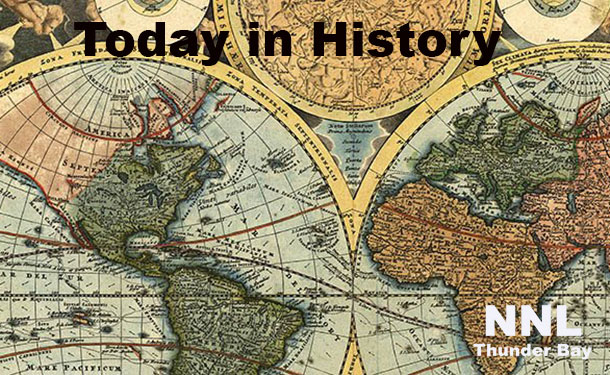THUNDER BAY – HISTORY – January 6 the day in history. It was on this day in 1941, that United States President Franklin D. Roosevelt delivered his “Four Freedoms Speech”.
The Four Freedoms were goals articulated by United States President Franklin D. Roosevelt on January 6, 1941. In an address known as the Four Freedoms speech (technically the 1941 State of the Union address), he proposed four fundamental freedoms that people “everywhere in the world” ought to enjoy:
- Freedom of speech
- Freedom of worship
- Freedom from want
- Freedom from fear
Roosevelt delivered his speech 11 months before the United States declared war on Japan, December 8, 1941. The State of the Union speech before Congress was largely about the national security of the United States and the threat to other democracies from world war that was being waged across the continents in the eastern hemisphere. In the speech, he made a break with the tradition of United States non-interventionism that had long been held in the United States. He outlined the U.S. role in helping allies already engaged in warfare.
In that context, he summarized the values of democracy behind the bipartisan consensus on international involvement that existed at the time. A famous quote from the speech prefaces those values: “As men do not live by bread alone, they do not fight by armaments alone.” In the second half of the speech, he lists the benefits of democracy, which includes economic opportunity, employment, social security, and the promise of “adequate health care”. The first two freedoms, of speech and religion, are protected by the First Amendmentin the United States Constitution. His inclusion of the latter two freedoms went beyond the traditional Constitutional values protected by the U.S. Bill of Rights. Roosevelt endorsed a broader human right to economic security and anticipated what would become known decades later as the “human security” paradigm in social science and economic development. He also included the “freedom from fear” against national aggression before the idea of a United Nations for this protection was envisioned or discussed by world leaders and allied nations.
Significant Events on This Day in History
- 1066 – Harold Godwinson (or Harold II) is crowned King of England.
- 1118 – Reconquista: Alfonso the Battler conquers Zaragoza.
- 1205 – Philip of Swabia becomes King of the Romans.
- 1322 – Stephen Uroš III is crowned King of Serbia.
- 1355 – Charles I of Bohemia is crowned with the Iron Crown of Lombardy as King of Italy in Milan.
- 1449 – Constantine XI is crowned Byzantine Emperor at Mystras.
- 1492 – The Catholic Monarchs Ferdinand and Isabella enter Granada, completing the Reconquista.
- 1540 – King Henry VIII of England marries Anne of Cleves.
- 1579 – The Union of Arras is signed.
- 1661 – English Restoration: The Fifth Monarchists unsuccessfully attempt to seize control of London, England.
- 1690 – Joseph, son of Emperor Leopold I, becomes King of the Romans.
- 1721 – The Committee of Inquiry on the South Sea Bubble publishes its findings.
- 1781 – In the Battle of Jersey, the British defeat the last attempt by France to invade Jersey.
- 1809 – Combined British, Portuguese and colonial Brazilian forces begin the Invasion of Cayenne during the Napoleonic Wars.
- 1838 – Alfred Vail demonstrates a telegraph system using dots and dashes (this is the forerunner of Morse code).
- 1839 – The most damaging storm in 300 years sweeps across Ireland, damaging or destroying more than 20% of the houses in Dublin.
- 1853 – President-elect of the United States Franklin Pierce and his family are involved in a train wreck near Andover, Massachusetts. Pierce’s 11-year-old son Benjamin is killed in the crash.
- 1870 – The inauguration of the Musikverein in Vienna, Austria.
- 1893 – The Washington National Cathedral is chartered by Congress. The charter is signed by President Benjamin Harrison.
- 1900 – Second Boer War: Having already sieged the fortress at Ladysmith, Boer forces attack it, but are driven back by British defenders.
- 1907 – Maria Montessori opens her first school and daycare center for working class children in Rome, Italy.
- 1912 – New Mexico is admitted to the Union as the 47th U.S. state.
- 1912 – German geophysicist Alfred Wegener first presents his theory of continental drift.
- 1921 – Formation of the Iraqi Army.
- 1929 – King Alexander of the Serbs, Croats and Slovenes suspends his country’s constitution (the January 6th Dictatorship).
- 1929 – Mother Teresa arrives in Calcutta, India to begin her work among India’s poorest and sick people.
- 1930 – The first diesel-engined automobile trip is completed, from Indianapolis, Indiana, to New York, New York.
- 1931 – Thomas Edison submits his last patent application.
- 1941 – United States President Franklin D. Roosevelt delivers his Four Freedoms speech in the State of the Union address.
- 1947 – Pan American Airlines becomes the first commercial airline to schedule a flight around the world.
- 1950 – The United Kingdom recognizes the People’s Republic of China. The Republic of China severs diplomatic relations with the UK in response.
- 1951 – Korean War: An estimated 200–1,300 South Korean communist sympathizers are slaughtered in what becomes the Ganghwa massacre.
- 1953 – The first Asian Socialist Conference opens in Rangoon, Burma.
- 1960 – National Airlines Flight 2511 is destroyed in mid-air by a bomb, while en route from New York City to Miami, Florida.
- 1960 – The Associations Law comes into force in Iraq, allowing registration of political parties.
- 1967 – Vietnam War: United States Marine Corps and ARVN troops launch “Operation Deckhouse Five” in the Mekong River delta.
- 1974 – In response to the 1973 oil crisis, daylight saving time commences nearly four months early in the United States.
- 1978 – The Crown of St. Stephen (also known as the Holy Crown of Hungary) is returned to Hungary from the United States, where it was held after World War II.
- 1992 – President of Georgia Zviad Gamsakhurdia flees the country as a result of the military coup.
- 1993 – Indian Border Security Force units kill 55 Kashmiri civilians in Sopore, Jammu and Kashmir, in revenge after militants ambushed a BSF patrol.
- 1994 – Nancy Kerrigan is clubbed on the knee at the U.S. Figure Skating Championships in Detroit, Michigan.
- 1995 – A chemical fire in an apartment complex in Manila, Philippines, leads to the discovery of plans for Project Bojinka, a mass-terrorist attack.
- 2000 – Celia, the last Pyrenean Ibex was found dead after a tree had landed on her.
- 2005 – American Civil Rights Movement: Edgar Ray Killen is arrested as a suspect in the 1964 murders of three civil rights workers.
- 2005 – A train collision in Graniteville, South Carolina, releases about 60 tons of chlorine gas.
- 2009 – Israel conducts an assault on Gaza. Operation Cast Lead





